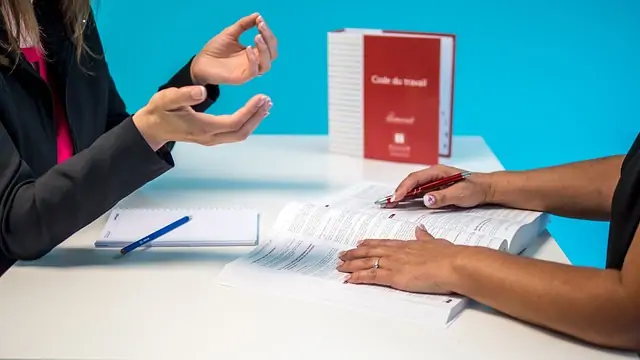This post contains affiliate links. It means that if you click on the links and make a purchase, we will receive a small commission at no additional cost to you. This allows our blog to continue providing you with free information. We only include links and products that we truly believe in. You can read the full disclosure here.
Do you know that there are hidden meanings behind each sentence in your reference letter in Germany which can be translated to a rating? How can you decode your reference letter and improve the wordings so that you will be seen more positively by your future employers? In this post, I will talk about the reference letter system in Germany, how you can decode your reference letter and why it is important to do so.
Moving to Germany or new in Germany? Check out our Resources Page for all the help you need!
Before I moved to Germany, I have already heard about the famous bureaucracy in Germany. Only after moving here, I can fully feel what it means. The reference letter in Germany is a perfect example.
Back in my home town Hong Kong, a reference letter is simply a letter provided by the employer which includes a performance evaluation of the employee. There are no specific rules about the format or whatsoever.
Very often, when an employee requests a reference letter from his boss in Hong Kong, the boss will ask the employee to write the reference letter himself. This is to save some workload from the boss. The boss would just need to review the written reference letter from the employee and make any adjustments if needed.
Reference letter in Germany
In Germany, it is a completely different story. A reference letter (Arbeitzeugnis) in Germany is a document that is formally regulated. Every employee has the right to request a reference letter from their employer. However, they must actively ask for it.
Don’t underestimate the importance to have a reference letter. Most German employers place a lot of importance on the reference letter. If you do not have one when you apply for a new job in Germany, it can be seen very negatively by the German employers.
If you are a foreigner and have not worked in Germany before, the employers in Germany may not ask for the reference letter from your previous jobs. However, once you have worked in Germany, you are expected to have your reference letters for your previous jobs in Germany.
Read also:
- Want to Work in Germany? Tips from Industry Experts
- How to write your CV in Germany (+ English template!)
- How To Write Your Cover Letter in Germany (+ English Example!)
- Salary in Germany: Are you getting paid enough?
Types of reference letters in Germany
There are different types of reference letters in Germany.
Simple reference letter (einfaches Arbeitszeugnis)
This is a simple version of reference letter in Germany. It is normally for short term employment like an internship or summer job. This reference letter includes the basic details of employment like the date and duration of employment, and the main tasks performed by the employees.
Qualified reference letter(qualifizertes Arbeitszeugnis)
This is a detailed version of reference letter in Germany. On top of the basic information provided in the simple reference, a qualified reference letter includes also a performance evaluation of the employee. There is an assessment of the employee’s skills, knowledge, work behavior, etc.
Interim reference letter (zwischenzeugnis)
The interim reference letter in Germany is very similar to the qualified reference letter. The only difference is that you do not have to leave the company before you get the interim reference letter.
If you change a role within the same company, you can request an interim reference letter for your previous role. For example, if you move internally from a finance role to an HR role, you can request an interim reference letter as your scope of work has been changed.
What is so crazy about the reference letter in Germany?
By law, the reference letter in Germany is a formal document and it must be written in German. If you work in an international company in Germany, your company may provide an extra English translation for your reference letter. However, the English letter is simply a translation and only the German version is the “real” reference letter that your future German employers would care about.
Read also: How I got my permanent full-time job in Germany without speaking German?
According to the law, the reference letter should not mention any negative aspects of the employees which may hinder them to find their next jobs. However, the reference letter should also be true and objective at the same time. How can this be possible?
Over the years, employers in Germany have invented a very creative way to write reference letters for their employees. The reference letters contain only positive messages. This is to ensure that no negative aspects of the employees are mentioned. However, the content of the reference letters is still true and objective, because there are hidden meanings behind all these positive sentences in the reference letter.
Basically, employers are writing reference letters using some kind of “special coding”. If you are not familiar with this “coding system”, especially for foreigners, you will find the reference letters very positive. However, every employer in Germany knows how to “decode” the reference letter to reveal its real meaning. And the truth is that the messages hidden in your reference letter may not be as positive as you think.

Decoding your reference letter in Germany
To decode your reference letter, you would first need to have some understanding of the German grading system. If you studied in Germany, you probably know what I mean. German grading consists of grade 1 to grade 6, with 1 being the best and 6 being the worst.
Almost every sentence in your reference letter represents a grading of your work performance. A subtle wording difference can mean a completely different grade. We can take a look at some simple examples below:
German grade 1 = Very good
In German: Er hat die Aufgaben stets zu unserer vollsten Zufriedenheit erledigt.
English translation: He has always done the tasks to our fullest satisfaction.
German grade 2 = Good
In German: Er hat die Aufgaben stets zu unserer vollen Zufriedenheit erledigt.
English translation: He has always done the tasks to our full satisfaction.
German grade 3 = Satisfactory
In German: Er hat die Aufgaben zu unserer vollen Zufriedenheit erledigt.
English translation: He has done the tasks to our full satisfaction.
German grade 4 = Adequate
In German: Er hat die Aufgaben zu unserer Zufriedenheit erledigt.
English translation: He has done the tasks to our satisfaction.
German grade 5 = Insufficient
In German: Er erfüllte seine Aufgaben im Allgemeinen zu unserer Zufriedenheit.
English translation: He fulfilled his duties to our satisfaction in general.
German grade 6 = Insufficient
In German: Er bemühte sich, unseren Anforderungen zu entsprechen.
English translation: He has made an effort to meet our requirements.
These are just some of the common examples. There are different variations of how an employer can write the sentences differently which convey the same grade. Big companies usually use software to help them to generate the reference letters.
Firstly, the manager needs to decide on the grading for each work aspect for the employee. Based on this grading, the software will generate the letter automatically. If you are interested, you can just search for an online generator for reference letter in Germany. There are plenty of them which help the employers to write a reference letter easily.
Other tricks used in the reference letter in Germany
Besides the different wordings, there are other ways which help a reference letter to contain hidden meanings.
Missing an important aspect
Every reference letter is supposed to contain an evaluation of all the important work aspects, e.g. technical knowledge, motivation level, working attitude, work quality, capability, social aspect, etc. If a reference letter completely omits one of these aspects, it can be seen very negatively by future employers.
Let’s think about it: You are the manager of several employees in the company. However, in your reference letter, there is nothing mentioned about your leadership skills or management style. Isn’t it very strange?
Another important fact that should be mentioned in a reference letter is why the employee left the company. If nothing is mentioned about the reason, it can mean that the work contract was ended badly.
Order of words used in a reference letter
Sometimes, the order of words used also matters. Here is an example:
In German: Sein Verhalten gegenüber Kollegen und Vorgesetzten war zufriedenstellend.
English translation: His behavior towards colleagues and supervisors was satisfactory.
Note that colleagues are mentioned before the supervisors in this sentence. It can mean that this employee has a better relationship with his colleagues than with his supervisors, which may also indicate that he does not have a very good relationship with his boss.
Similarly, if the sentences used in the reference letter focus a lot on the interaction with colleagues, it can mean that the employee has some problems with his management.
How to decode your reference letter in Germany?
Now, we have talked about all these crazy coding in a German reference letter. As a foreigner, if you receive a reference letter from your employer, how can you know what it actually means?
Trust me. This is not only about the language. This is not something that just a native German person can advise you. Indeed, you would need a lawyer to help you to decode your reference letter. I know it sounds completely crazy. But hey, we are in Germany!

Why should you use a lawyer to check your reference letter in Germany?
I did pay for a lawyer to check my reference letter and tell me exactly what each sentence means. I used this website for the check. Everything was done online by their lawyers at a very affordable price. I just had to upload my reference letter online and I got their feedback within 24 hours. (You can even get the feedback within 4 hours if you pay more.)
It costs only 19 EUR for a basic check. A qualified lawyer will tell you your overall grading based on your reference letter. He will also proofread if all aspects are included and if the order is correct, etc.
For me, I used the Pro check which cost 39 EUR. I got a detailed analysis within a day from my lawyer. The analysis translated each sentence in my reference letter to a grading. The lawyer also gave me suggestions on how to change certain wordings to improve my reference letter.
I sent all these suggestions to my HR and they just changed everything accordingly. The best part is that my lawyer also answered all my follow-up questions timely without any extra costs.
I was super happy to find this service at such an affordable price, as I know hiring a lawyer is usually very expensive. I highly recommend you to check your reference letter as well and below are the reasons why it is totally worth it.
The cost of the lawyer is often covered by the law protection insurance
If you do not yet have law protection insurance (Rechtsschutzversicherung), you definitely need to get one! Why? I have written a blog post and it tells you all the reasons why you absolutely need a law protection insurance, especially when you are in Germany!
We recommend using GetSafe law protection insurance because it offers English support and requires no paperwork. You can get 15 EUR discount using this special link.
Alternatively, you can also get a law protection insurance policy easily online in Tarifcheck. Just choose the insurance and the coverage which is most suitable for your situation.
The good news is that the cost of the lawyer is often covered by the law protection insurance. It means that you can get your reference letter proofread and corrected for free or for a very low price, depending on your insurance.
You can also use the online service by Yourxpert to get a free online initial assessment from a lawyer. Simply write your question below. The initial assessment or recommendation is free of charge. If you decide to take further actions, you will get a non-binding offer with the price and you can decide if you want to take the offer.
If you prefer to contact a lawyer directly by writing a message, by phone or by chat, you can find the prices for different lawyers here.
Grammatical mistakes in a German reference letter
You would be surprised how common it is to have grammatical mistakes in a reference letter in Germany. Many employers are not specialized in writing reference letters. Even for big corporations, grammatical mistakes happen very often. The lawyer can check and make sure the grammar used in the letter is correct.
On top of grammar, the lawyer will also check if the appropriate format is used in a reference letter. For example, the text format, the letterhead, and signatures. There are many rules concerning a reference letter and the lawyer can make sure that the letter complies with all these rules.
If the reference letter you use does not have an appropriate format or contains lots of grammatical mistakes, it will be seen very negatively by future employers. It is because it shows that your current employer does not show professionalism and does not really care about providing you with a good reference letter.
Avoid providing a bad reference letter to your future employers
A lawyer can help to decode your reference letter and tell you exactly about the grading of each sentence used in the letter. Without this decoding, you will have no clues what your reference letter actually means (because it will always look nice with positive wordings).
In case you find out that your reference letter actually does not contain good gradings, it may be wise not to provide your reference letter to the future employers. Providing a bad reference letter is worse than not providing a reference letter at all.
Ask HR to amend your reference letter
You can ask the lawyer to proofread and correct your reference letter. It means that the lawyer will not only check for grammatical mistakes and let you know your gradings, but he will also give you suggestions on how you can change the wordings to make you a more positive reference letter. You can then take these suggestions and ask your HR to amend your reference letter accordingly.
This is what I have done. My reference letter contains grade 1 in almost all the work aspects. However, in the overall assessment, it states only satisfactory. My lawyer suggested me to ask HR to change my overall assessment to grade 1 as well, so it could be more consistent with the other parts of the letter.
My lawyer provided the exact wordings to change and I sent the whole amended paragraph to the HR. The good news is that HR will satisfy those change requests in most cases.
No referee section in a reference letter in Germany
In many other countries, it is common to have a referee section in a reference letter. It means that if your future employers would like to learn more about your work performance, they can call your current boss or colleagues and get inputs from them.
However, this is not a common practice in Germany. There is normally no referee section in a reference letter in Germany. It means that if your future employers want to know more about your previous work performance, your reference letter will be the main indicator.
This explains why many people insist so much on the wording used in the reference letter and this may even lead to a lawsuit. This is so important to make sure you have a good reference letter as you deserve one, after putting all your years and effort into working for your employer. And a lawyer can help you with this.
Time is ticking!
If your work contract does not state specifically, you have normally around three to four months to ask your employer to make changes to your reference letter. Afterward, you may lose your right to ask your employer for an amendment. A lawyer can proofread or correct your reference letter very quickly (less than a few days) so that you can work with your HR to amend your letter shortly (before it is too late!).

Asking your work council to help
If you have no money to neither get a law protection insurance nor pay for the lawyer to check your reference letter, you may try to get help from the employee representatives from your work council (Betriebsrat). Those people are normally specialized in labor law and may be able to give you advice regarding your reference letter.
Most reference letters in Germany contain good ratings
The good news is that most of the reference letters in Germany contain good or very good rating. Employers in Germany seldom issue reference letters with ratings worse than satisfactory. This is to avoid any potential legal disputes. Companies will need clear evidence in court to prove that an employee is a very bad performer.
On the other hand, it is harder for an employee to go for legal action to change a rating from good to very good. It is because the employee would also need to prove in court that he is somehow better than an average employee.
Therefore, for most of the future employers, they will see satisfactory as a minimum rating. You would want to get a reference letter from your employer with at least a good or very good rating, in order to increase your chances of getting hired in your future jobs.
Read also: My job interviews in Germany: 6 tips to boost your chances of getting hired.
Do not forget to ask for your reference letter in time!
After you leave your job, you have 3 years to request a reference letter from your employer in Germany. Do not forget to actively ask for it! Your employer will most likely not provide the reference letter to you if you don’t request it. And after you get your letter, make sure to check it and request any amendment within 3-4 months. It is important that you don’t forgo any of your rights in this aspect!

Disclaimer
Please be aware that this article is intended to provide you a brief overview of reference letter in Germany. The information and tips in this article are based on personal experiences and thorough research.
This article does not represent professional advice. This blog is not qualified to give you any legal advice according to German law and we do not accept any form of liability resulting from reading this article. Our blog makes no guarantee as to the accuracy or timeliness of the information in this article.
If you need individual advice, please consult with a lawyer.
Have you got already a reference letter in Germany? Have you had your reference letter checked and corrected? Leave a comment below and let me know your experience!
[facebook-page-plugin href=”foreigneringermany/” cover=”true” facepile=”false” cta=”false” small=”true” adapt=”true” link=”true” linktext=”Follow me on my facebook page!” ]
Moving to Germany or new in Germany? Check out our Resources Page for all the help you need!
If you found this article helpful, consider supporting this website by buying me a coffee. Every small donation helps to keep this blog alive. You can also ask me any questions here. Buy me a coffee








Hello,
Thanks for your information. The last company I worked for is Taiwan and the HR can the reference letter only in English. What could we do, since you mentioned the reference letter muss be in Germany?
Thank you for your reply.
The decoding of reference letter is only for reference letter in Germany, because of this coding system. It is a Germany specific thing. If you had a job outside Germany, then you do not need to do this decoding.
I find this article interesting and complete, thanks! I have an issue: my boss and I have a conflictual relationship. He/she did not provided reference letter to a former colleague even after being asked to do so. What can I do to push my boss to provide a reference letter in case he refuse to sign it? Clearly, then there will the issue to check the grading of the letter….
You employer is legally required to provide you the reference letter if you request for it. If you have problem to get your reference letter, you should send the request to your employer again in writing, and state a reasonable deadline. This is to provide a proof for any legal action later that you have already requested it but the employer refused to provide the letter. Do you have a legal protection insurance? If your employer refuses to give you a reference letter, the best is to ask for advice from a lawyer.
Very good information. I am just wondering how fast the Arbeitszeugnis needs to be provided to an employee in the first place? Is it that the ex-employer hasn’t provided it after 2 months I left the company, even though I has asked for it few times?
Marie,
Thanks for the comment! Did your employer give you a reason why he is still not sending you the Arbeitszeugnis? Did you put a deadline to your employer when you request your Arbeitszeugnis? Normally, it is customary to set a deadline of two to three weeks. If the preparation of Arbeitszeugnis takes longer than that, the employer should have a valid reason for the delay. For example, maybe there are a lot of requests he has to process due to a mass layoffs. If your employer refuses to issue you the Arbeitszeugnis, you may want to hire a lawyer to help.
Hope it helps,
Sindy
Hi, very late reply from my side, but thank you for yours 🙂
Yes, I asked for the Arbeitszeugnis, when I left the company, I asked it after a month again, and for the second time after 1,5 months and I gave a deadline (in 2 weeks). I did not receive it by the deadline.
First, the reason was that they haven’t had time to do it because HR has many things to take care of. The second was that my ex-superior still hadn’t given me any grading to the system.
I think those were not good reasons. I told them in the last email that if I haven’t received it by the next day (I had to provide it as a part of a proposal/quote materials), I will contact my lawyer. I put the ex-employers lawyer and Betriebsrat as CC.
I got it 2 days after that, and it was too late to add it to the quote materials. That was really unfortunate.
Best,
Marie
Marie,
Thanks a lot for sharing! Yes that was really unfortunate. It also showed that the employer needed some “push” to get things done. Next time if you are in this situation again, you know how to accelerate things..
Best regards,
Sindy